Roofing nails help hold all the roofing materials altogether. Without them, it would be impossible to secure shingles, sheathings, and roof shingles. If you ever wondered how long it takes for a roofing nail to rust, wonder no more as we researched all the answers and have them for you!
Most roofing nails could last a lifetime, while some roofing nails may have 2o-50 years of lifespan before it completely rusts out useless. However, this entirely depends on the type of nail being used.
There are various types of roofing nails that you can choose from. Each has contrastive characteristics, durability, and sizes. If you want to know more about the kinds of roofing nails and how long it takes for them to rust, read further and find out!
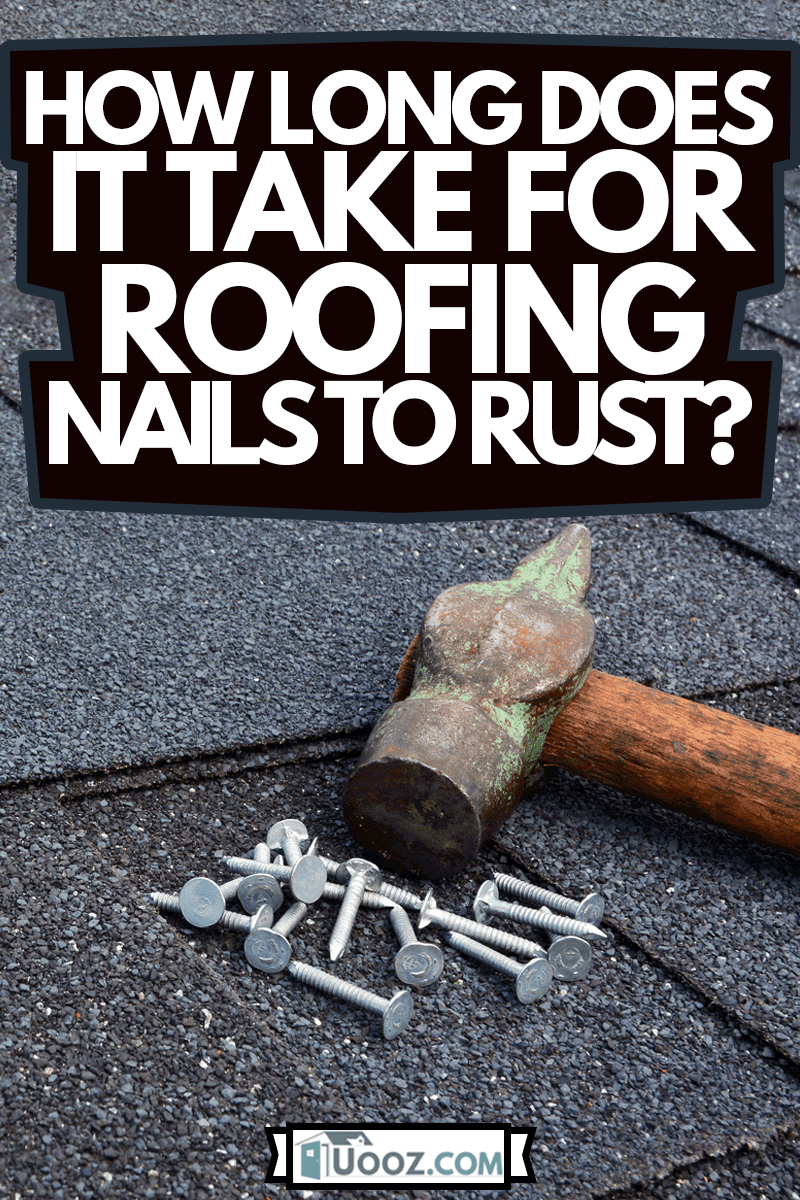
Types Of Roofing Nails
It is essential to know the types of roofing nails to understand when they can be applied and how they will match other roofing materials.
Let's delve into the five different types of roofing nails, their distinct characteristics, and how long they take to rust.
1. Aluminum Roofing Nails
This type of nail is made out of high-tensile aluminum alloy for bend resistance. It has a flat head with a bright silvery color that's pleasant to look at and can also serve as decoration. This roofing nail is usually used for metal roofs and shingles.
Aluminum roofing nails resist corrosion, bending, and provide proper hanging. Plus, they guarantee easy driving. They can last a lifetime or more or less than 10 to 20 years.
Despite that, this type of roofing nail is certainly not recommended for environments that are open to chemicals and salt like coastal areas; exposing them to these can cause them to eventually corrode.
2. Galvanized Roofing Nails
This roofing nail is basically a steel nail coated with Zinc. It's commonly used in asphalt shingles and known to last for a lifetime.
This type is resilient to rust; that's why the majority of professional roofers opt for this as a standard choice. There are two kinds of Galvanized roofing nails for you to choose from:
Hot-Dipped Galvanized
These are galvanized steel nails dipped into a molten pool of zinc and are considered as one of the most effective methods of galvanization.
Gootop's hot-dipped galvanized siding nails are perfect for rough nail and sheathing as it guarantees protection from corrosion and pressure-treated lumber.
See Gootop's hot-dipped galvanized nails on Amazon.
Electro-Galvanized
This type still grants the same zinc coating however processed in a different method by using an electrical current solution that attaches zinc ions to the nail's base metal.
Grip Rite's 1-1/2-Inch Electro-Galvanized roofing nail has a large head and a heavier shank gauge built to possess great holding power and can best be applied to asphalt shingles, insulation boards, and felt-to-wood substrates.
See Grip Rite's electro-galvanized roofing nail on Amazon.
3. Copper Roofing Nails
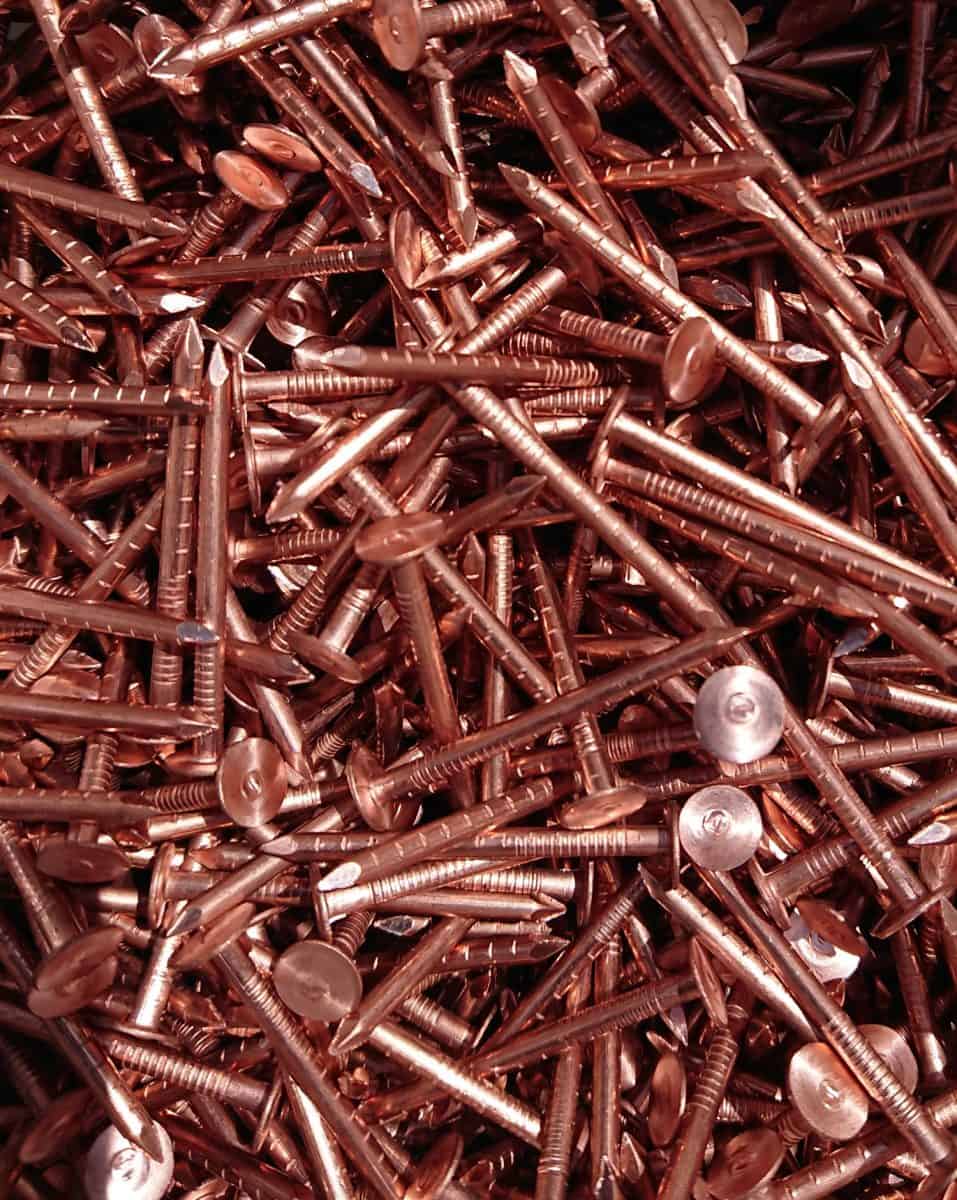
Copper nails are made of copper wires from different diameters. This is one of the most expensive roofing nails of all types since it is completely rust-proof and guaranteed high quality.
Copper nails are best used for lifetime roofing products such as clay, slate, tile, and copper roofing.
Dubbs Hardware's pure copper nails are perfect for roofing nail finishes, and they ensure the highest quality of copper nails that ensures versatility in all sorts of house projects.
See Dubbs Hardware's copper roofing nails on Amazon
4. Stainless Steel Roofing Nails
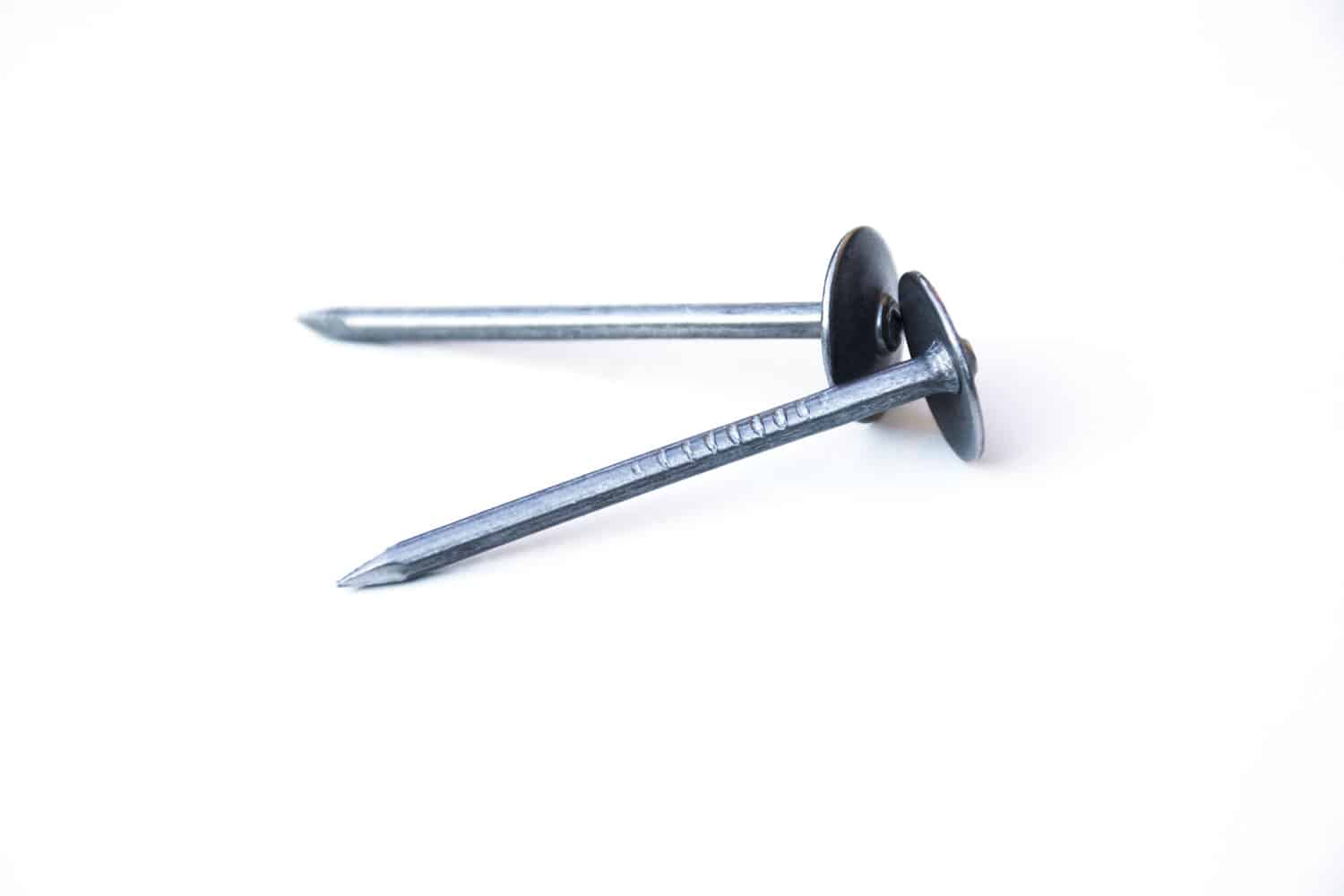
Stainless steel roofing nails are made up of alloy steel, chromium, and nickel forged together to create a metal that is resistant to corrosion. Additionally, it can endure all forms of mineral reactions from the wood and possible lead in the rainwater.
This is best applied on wooden shingles and is most highly recommended for indoor use. There are different grains for stainless steel roofing nails that can also be used outdoors. This type can also last a lifetime and is best for 20-30 years.
5. Button Cap Nails
Button cap nails are made up of steel shank and a large polyethylene cap that helps prevent leaks on the roof. It is usually applied to the roofing felt.
Its material is made of high carbon steel, and its plastic round head can vary in different colors. This type can also last for 10-20 years. However, the plastic cap may wear out for a year, depending on the type of environment it's exposed to.
Types Of Nail Shanks
Nail shanks do most of the holding when roofing nails are installed. The shank is forced between the fibers of the wood. When attached, the wood pressures against the shank, giving a tight grip.
There are three common types of nail shanks to help you understand how they work:
1. Smooth Shank
This type of nail shank has a smooth appearance and is considered the most economical type of nail because of its standard form. It's the easiest nail to drive, and the air consumption per nail can be lower.
2. Spiral Shank
This type of nail has a threaded appearance, almost looking like a screw that has visible helical twists. Spiral shanks help increase the force between fibers of wood, so this is quite difficult to remove.
3. Ring Shank
Ring shanks have a series of rings into the surface of the shank, and like the spiral shank, their air consumption is higher, and they have a tight grip once they are driven into wood.
For your best, you can hear out this discussion by Roofing Insights on YouTube for additional information on the roofing nails discussed above.
What Factors To Consider When Choosing Roofing Nails?

Roofing nails, no matter how small, are one of the most paramount materials to complete your roof because they play a significant role in establishing a solid application.
It is imperative to select a roofing nail that will grant you long-lasting durability. On the verge of choosing what roofing nails to get, here are some of the factors you need to consider:
Nail Material
This pertains to the types of nails you need to get based on what roofing materials you'll have and what environment you're living in. For instance, galvanized nails are fit for asphalt shingles and stainless steel nails for slate or tiles.
Nail Shape
This aspect refers to textures and materials that should match the shank of your nails. Some nail shapes are built for roofing projects while some aren't, which is why it's smart to determine what nail roofings would go with asphalt, metal roof, clay, concrete tiles, and other types of roofing materials.
Nail Size
Lastly, this aspect refers to the standard length of roofing nails that will go with your roof structure and roofing materials. The longer the nails, the bigger the gauge.
Note that the length of the nail should always depend on the materials and thickness of the roof layer underneath.
How Do You Prevent Roofing Nails From Rusting?
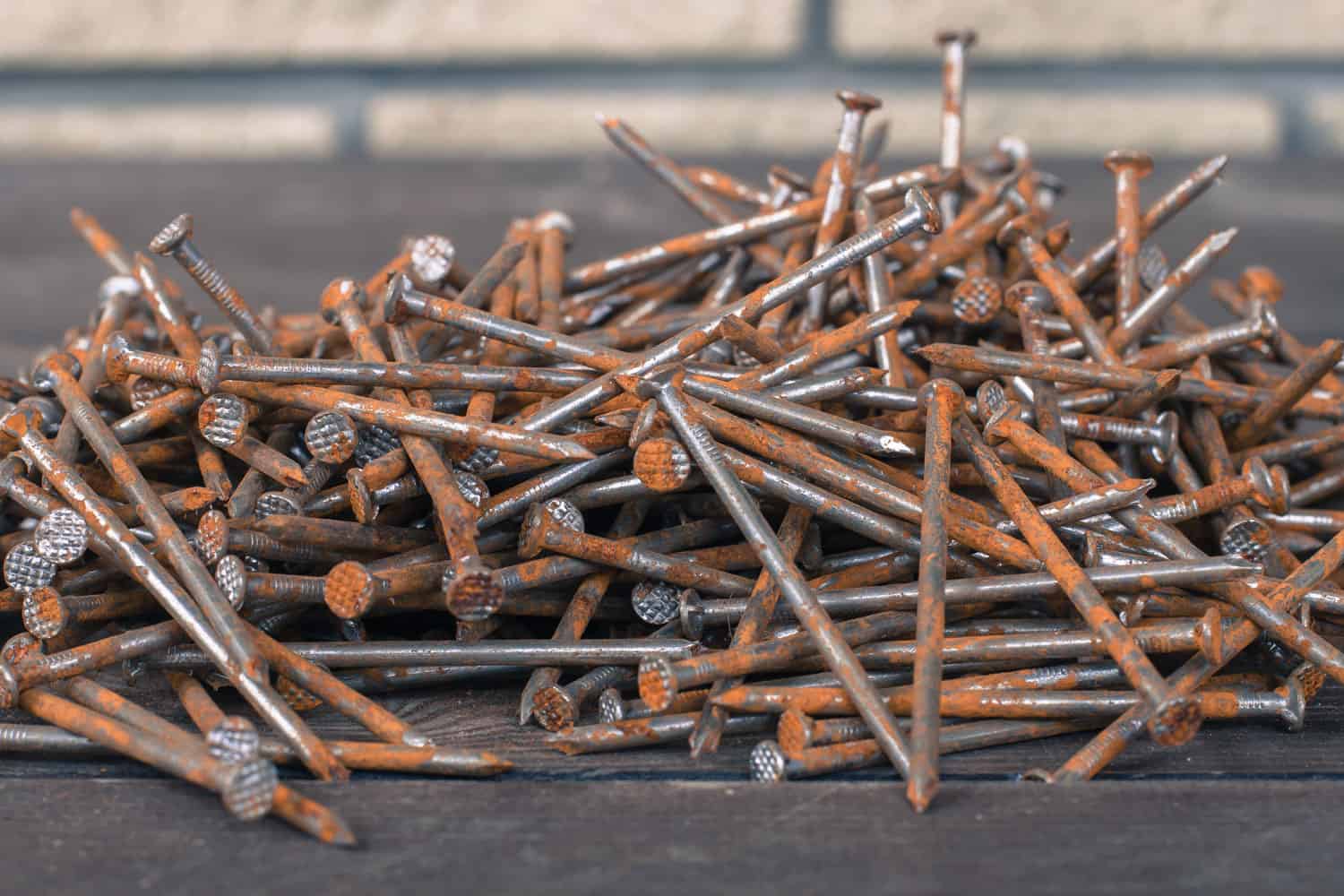
One of the most effective ways to prevent your roofing nails from rust is to seal them with a roofing sealant. At the same time, you can also make use of a spray-on clear coat like a Rust-Oleum Spray Enamel.
Rust-Oleum's universal enamel spray paint is made with an oil-based formula that's got an excellent adhesion to prevent rust, fading, and chipping.
Click here to see Rust-Oleum's spray enamel on Amazon
For additional discussion on preventing rust, you can check out Metal Supermarkets' YouTube video.
For a similar discussion on rust, you may also want to read "Does Metal Roofing Rust Or Fade In Color?"
Can You Reuse Roofing Nails?
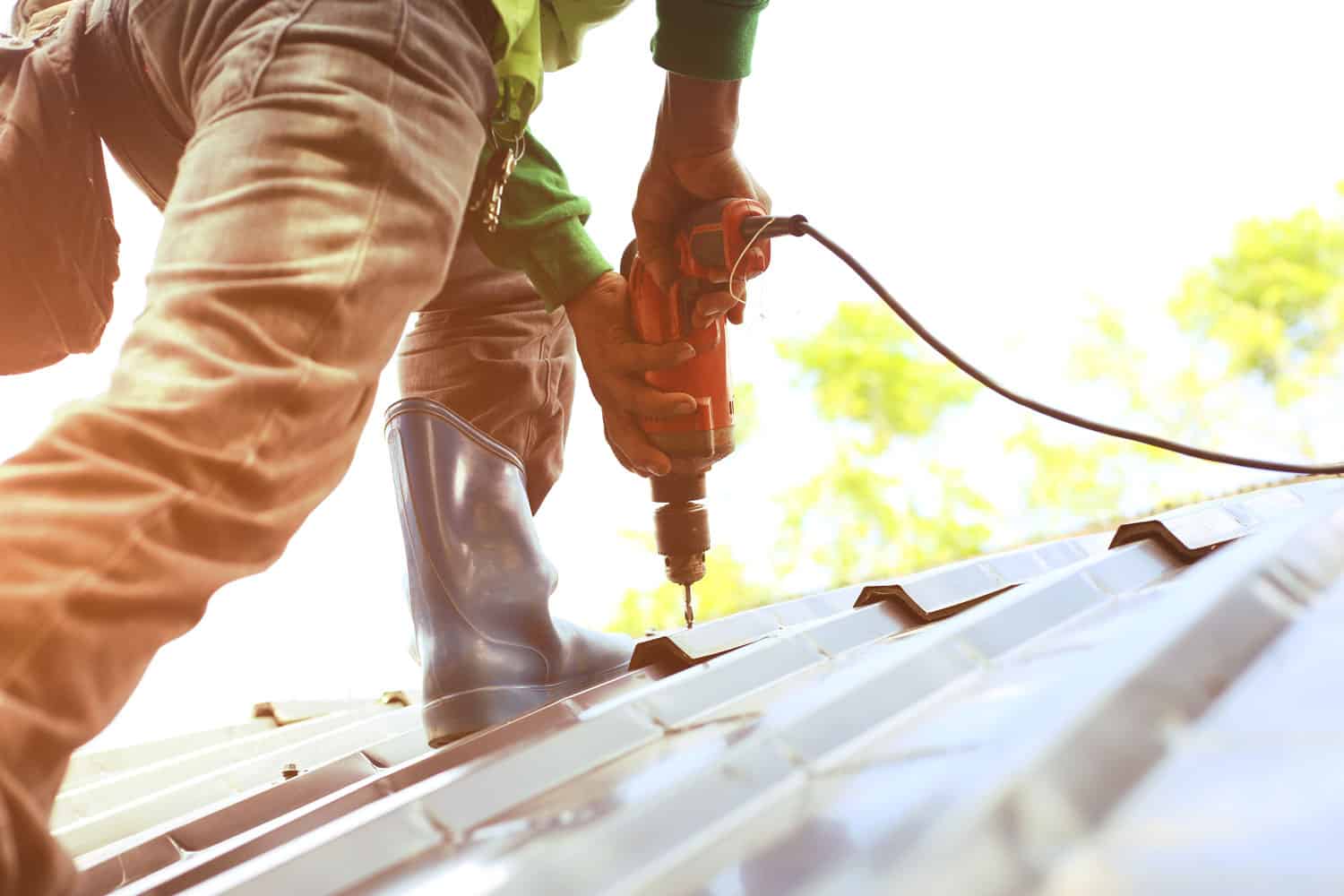
In the process of tearing your whole shingles, sheathings, and felt off for a whole new roof, it can be tempting to reuse roofing nails since this technique can make a big difference in your costs.
If you plan on doing this, don't! It's a terrible idea. Firstly, it's going to be absolutely impossible to yank out roofing nails in place. Second, their Zinc coating has probably worn out, if galvanized, so it's possible to cause leaks on your roof.
Not only that, these nails may not have the substantial amount of strength to withstand strong winds and heavy rain. Aside from the aforementioned consequences, reusing roofing nails may cause major inconveniences to your new roof. It's smart to buy a new set of fresh roofing nails instead.
Final Words
You can now breathe a big sigh of relief, knowing that roofing nails take a long time to rust. Plus, you have supplementary tips on how to prevent rust and what types of nails to get. Happy roofing!
If you enjoyed this article, you can visit the following articles on our site:




